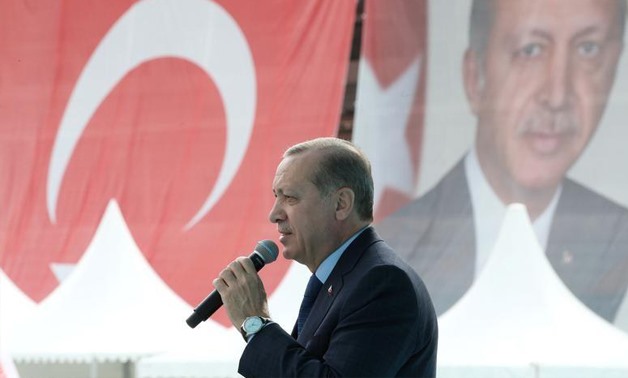
Turkish President Tayyip Erdogan delivers a speech during a ceremony in Bursa, Turkey April 5, 2017. Yasin Bulbul/Presidential Palace/Handout via REUTERS
CAIRO – 21 September 2017: Amid threats from Baghdad and Turkey, Prime Minister of the Kurdistan Region, Nechirvan Barzani, is confident that there will be no military attacks on the Kurdistan Region if the independence referendum goes ahead as planned on September 25.
“I do not see any military attack at all on the Kurdistan Region. It is impossible to happen,” PM Barzani told reporters on Wednesday.
“Military threats against what? Against the referendum?” PM Barzani asked. “I do not foresee that at all. Even if they take other measures, as allegedly they are going to do, but a military option is impossible.”
However, Turkey is currently conducting military strikes inside the Iraqi Kurdish Region.
Turkish airstrikes have killed several people on Tuesday night in the Dohuk Governorate, claiming it was removing Kurdistan Workers' Party (PKK) threats in northern Iraq.
Major Kurdish parties, Gorran and Kurdistan Islamic Group (Komal), who boycotted the opening of the Kurdish Parliament last week and have refused to participate in the High Referendum Council, have said that holding the independence referendum amid numerous crises is a “dangerous step.”
“The right of self-determination and the establishment of an independent state for Kurdistan is a natural right of Kurdistan’s nation,” and a referendum “is one of the tools to achieve this national objective,” read the statement, published on Gorran’s Sbeiy media on Wednesday.
“However, holding a referendum under the current complex circumstances marked by numerous crises and an uncertain future doesn’t serve this strategy. Rather, it is a dangerous step for now and the future of our nation.”
The international community has stepped up its rhetoric in opposition to the independence referendum taking place.
Federica Mogherini, High Representative of the European Union for Foreign Affairs and Security Policy and Vice-President of the European Commission, has called on the authorities of Iraqi Kurdistan not to hold a referendum on the independence of the region.
 European Union foreign policy chief Federica Mogherini addresses a news conference during a European Union foreign ministers meeting in Brussels, Belgium, July 20, 2015. REUTERS/Francois Lenoir
European Union foreign policy chief Federica Mogherini addresses a news conference during a European Union foreign ministers meeting in Brussels, Belgium, July 20, 2015. REUTERS/Francois Lenoir
“The European Union reiterates its steadfast support for Iraq's unity, sovereignty and territorial integrity. Unilateral actions, such as the proposed referendum, is counterproductive and must be avoided,” Mogherini said on Wednesday in a statement.
“The EU recognises there are outstanding issues between Erbil and Baghdad that need to be resolved. This should be done through a peaceful and constructive dialogue leading to a mutually agreed solution based on the full application of the provisions of the Iraqi Constitution.”
Saudi Arabia has also issued calls on Wednesday to urge the President of the Kurdish Region, Masoud Barzani, to call off the scheduled independence referendum.
Barzani should halt plans to hold a referendum "in light of the situation in the region and the dangers it is facing, and in order to avoid new crises," the state-run Saudi Press Agency said.
The referendum could have "negative consequences on the political, security and humanitarian fronts," and may also "affect efforts to establish security and stability in the region, as well as efforts to fight against terrorist organizations and their activities."
In the United States’ latest move, it has said that it is “highly unlikely” that Erbil and Baghdad will have international support for negotiations if the independence referendum goes ahead as planned.
“The United States urges Iraqi Kurdish leaders to accept the alternative, which is a serious and sustained dialogue with the central government, facilitated by the United States and United Nations, and other partners, on all matters of concern, including the future of the Baghdad-Erbil relationship,” read a U.S. State Department statement released on Wednesday.
“The referendum may jeopardize Iraqi Kurdistan’s regional trade relations, and international assistance of all kinds, even though none of Iraq’s partners wish this to be the case. This is simply the reality of this very serious situation,” the statement continued.
"If this referendum is conducted, it is highly unlikely that there will be negotiations with Baghdad, and the above international offer of support for negotiations will be foreclosed,” added the statement.
In the past week, several countries and institutions such as the United Kingdom, United Nations and the United States, have offered to facilitate dialogue between Erbil and Baghdad.
 Iraqi security forces march as they conduct a raid and weapons search operation in Hawija, April 24, 2014. REUTERS/Yahya Ahmad
In other news:
Iraqi security forces march as they conduct a raid and weapons search operation in Hawija, April 24, 2014. REUTERS/Yahya Ahmad
In other news:
Iraqi Prime Minister Haider al-Abadi has announced the start of the first stage of the operation to liberate Hawija from the Islamic State, early on Thursday.
“With the dawn of a new Iraqi day, we announce the launch of the first stage of the liberation of Hawija to fulfill our pledge to our people for liberating all of Iraq's territory and clearing it from Islamic State (IS) terrorists,” Abadi’s statement reads.
There is no agreement thus far to include the Kurdish Peshmerga forces in the operation to liberate Hawija from IS, however they will fortify the frontline in order to block escaping jihadists during the operation.



Comments
Leave a Comment